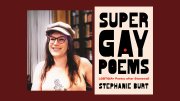In her new book, Super Gay Poems: LGBTQIA+ Poetry After Stonewall (Harvard, 2025), Loker professor of English Stephanie Burt gives voice to a shimmering variety of queer and transgender verse. “These are lives not represented, or not openly, or not often, or not well, in most of the poetry that most of us encounter most of the time,” she writes in the introduction. What follows is an anthology of 51 poems, each accompanied by a brief essay from Burt fusing literary analysis with aesthetic enthusiasms and chatty, insightful observations about the writers’ lived experiences and the poems’ historical context. Along the way, she builds an illuminating picture of queer poetics and draws out threads that connect writers across time and place. “It’s a book about our elders and our youth,” Burt writes. The poems, laid out in chronological order, were all published after the Stonewall Uprising of 1969, a series of riots and demonstrations that began after police raided the Stonewall Inn, a gay club in New York City’s Greenwich Village. The uprising became a catalyst for the modern gay rights movement.
A critic, scholar, and poet with nearly 20 titles to her name, Burt has been helping to shape readers’ understanding of poetry for three decades, and she is famous for her ardent and eclectic literary tastes: last year she taught an English course on Taylor Swift that sparked a media frenzy and attracted hundreds of interested students. She began working on Super Gay Poems about four years ago. Initially, it was intended as a sequel to The Poem Is You (Harvard, 2016), her anthology-slash-guidebook on 60 works of contemporary poetry. When Burt’s editor proposed a volume focused on the LGBTQ+ experience, she says, “It did not take much convincing.”
I won’t ask for a favorite poem in a book of favorites, but are there poems here that you hadn’t read before, or that surprised you upon rereading?
Absolutely—I knew when I started that I’d be using a double handful of poems I already loved, and a triple handful of poets, like D. A. Powell, where I really wasn’t sure what poems but knew I loved the poets. And I knew I wanted international, regional, and stylistic and formal and tonal, as well as demographic, variety. But I also knew that I had to read around, especially for poems published before about 1998 and for poems published only outside the U.S. Some of my favorite discoveries: the Melvin Dixon poem, which ought to have entered all the anthologies immediately upon publication—it’s so perfect and so sad!—and the Cherry Smyth poem, one of only two really good poems I know about queer abusive relationships. Also, not being Canadian, I didn’t know much about bill bissett [who styles his name as lowercase]. He’s so good and so much fun (though the particular poem we chose isn’t him at his most fun).
The starting point for the anthology is the Stonewall Uprising, a watershed moment when queer people fought back against government oppression. In 2025, when discrimination against queer and especially trans people is intensifying rapidly, what does a book like this mean?
It means as many things as the poems in it mean! But it also means: we’re here. We’re ourselves. We worked to get here and we’re not going away (well, not existentially; some of us might be going away from, say, Houston, or Mobile, or Bismarck, and moving—since Boston costs a ton—to Worcester, or Duluth, or Rochester, New York). Every poem that holds your interest says something, and shows you something, about how to live. We could use more models for how to live. Sad ones, weird ones, angry ones (like Paul Monette’s) and especially fun ones (like Chen Chen’s) and ones about growing old together and surviving and being ourselves (like U. A. Fanthorpe’s, not that people outside the U.K. know about U.A. Fanthorpe yet!).
What is the coolest, or strangest, or most interesting thing about poetry that most people don’t know?
How many kinds there are, and how many ways to write it, and to read it. Poetry names a set of techniques for arranging words so that the sounds of the words and the shapes of the phrases matter to how the words work. It’s not one thing, emotionally or culturally, any more than “music”—or even “pop music”—is one thing.
Where do you look for inspiration right now?
Some of the poets in the book, of course—Angie Estes! Trace Peterson!—and some great living poets who aren’t in the book, because they don’t identify as LGBTQ+ (Terrance Hayes—check out his poem about wigs! Allan Peterson! Jenny Bornholdt!), and some great dead poets (Whitman, Herbert, Marianne Moore), and my favorite songwriters (go listen to Game Theory’s The Big Shot Chronicles and then to Blueboy’s Unisex and then to We Come from the Same Place by Allo Darlin and any album by Heavenly, if you want to know what really makes me tick), and my kids and my partners. I feel very lucky and loved.
What are you working on next?
There’s going to be a book of poems by me, probably called Read the Room, in the next few years, and a book on Game Theory (the band, not the economic concept), if we’re lucky. But first there’s going to be a book about Taylor Swift. It’s called Taylor’s Version. Look for it in October!









